Target Audience
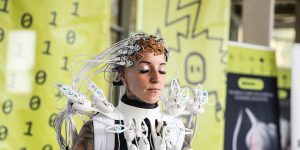
The Pangolin Scales
Thomas Faseth (AT), Harald Pretl (AT), Christoph Guger (AT), Anouk Wipprecht (NL)
The Pangolin Scales demonstrates the world’s first 1.024 channel brain-computer interface (BCI), which is able to extract information from the human brain with an unprecedented resolution to control an interactive, fashionable dress.
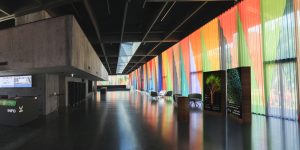
Treeversity
Johann Höller (AT), Thomas Lorenz (AT), Florian Gruber (AT), Ursula Niederländer (AT), Tanja Illetits-Motta (AT), Raphael Blasi (AT), Andreas Rösch (IT), Stefan Küll (AT)
Treeversity focuses on the relation between Big Data and data visualization to convey complex information at a glance. A mirror of the university’s inner workings, diligently recording success, failure and evolution. A portrait of its life in the form of a tree. Courses, grades and exams become branches, creating many different trees. Fully grown or nascent, withering or growing erratically. Treeversity shows the university as a forest, providing a tool to analyze its mechanisms at the same time.

Exposed Building
Michael Roland (AT), Michael Mayr (AT), Robert Holzinger (AT), Markus Vogl (AT)
By opening a maintenance hatch and hacking into the network infrastructure behind it, we acquire access to the electronic locking system. By controlling the buzzers built into the office door locks, we transform the Science Park 2 building into an orchestra and it resounds like a huge walk-in instrument. The installation playfully provokes thought about the vulnerability of modern technology and its growing risks for society.
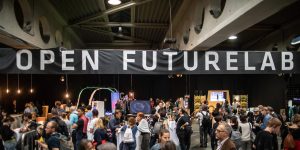
Open Futurelab Exhibition
The Open Futurelab Exhibition showcases the current research approaches and projects by the Ars Electronica Futurelab – Ars Electronica's Research and Development department.
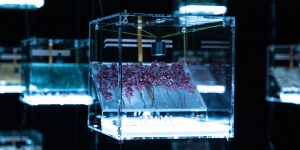
The Transparency of Randomness
Mathias Gartner (AT), Vera Tolazzi (AT)
"The Transparency of Randomness" is an interactive installation that provides insight into the world of randomness. Random numbers are continuously generated through a transparent dice system, to be used as the basis for real-time calculations and visualizations. Through its use of diverse materials, the process is influenced by the complexity of nature.
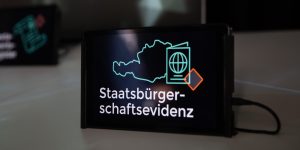
Digital Government in a Box
LIT Law Lab, Johannes Kepler University (AT)
From the “transparent citizen” and “social scoring” to AI-supported truth finding in the courtroom and machine-generated administrative notices: the digitization of administration and jurisdiction has many facets. It requires not only a consideration of what is technically possible, but also of what is legally permissible and what is desired in terms of legal policy. Against this background, the LIT Law Lab has two installations dedicated to the legal framework conditions (fundamental rights and data protection), problems and proposed solutions for a digitized enforcement.

Al truth machine
LIT Law Lab, Johannes Kepler Universität (AT)
From the “transparent citizen” and ”social scoring” to AI-supported truth finding in the courtroom and machine-generated administrative notices: the digitization of administration and jurisdiction has many facets. It requires not only a consideration of what is technically possible, but also what is legally permissible and what is desired in terms of legal policy. Against this background, the LIT Law Lab has two installations dedicated to the legal framework conditions (fundamental rights and data protection), problems and proposed solutions for a digitized enforcement.
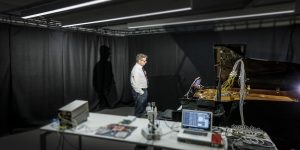
Biocomputer Rhythms
Interdisciplinary Centre for Computer Music Research (ICCMR), University of Plymouth (UK), Eduardo Reck Miranda (BR/UK)
Biocomputer Rhythms is a piece for prepared piano and percussion. It is a musical duet between a pianist and an intelligent interactive biocomputer. The biocomputer listens to the piano and produces musical responses during the performance. The responses are played on percussion instruments and on the piano by the pianist. The piano is prepared with electromagnetic actuators positioned inside the instrument to vibrate its strings. Electromagnetic actuators are also used to vibrate percussion instruments.
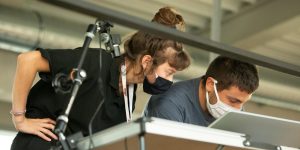
Performance Workshop: Enacting Innovation
Judith Igelsböck (AT), Friedrich Kirschner (DE), Sarah Buser (CH), Mónica Rikić (ES), Leoni Voegelin (CH), Tomás Montes Massa (CL), Laura Zoelzer (DE)
Enacting Innovation is a participatory staging of the social fabric surrounding contemporary innovation practices. Participants will negotiate the roles and situations that are frequently encountered in innovation processes and act out conflicts with each other and the technical infrastructures typically employed within such contexts. The simulation is inspired by research on ‘innovation scripts’ – the recipes followed in dealing with the omnipresent pressure to prove innovative ability.
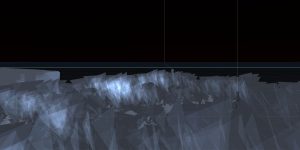
Random Rhetoric
MADE Group (GR)
“Random Rhetoric“ refers to computerized practices in politics, which are carried out through computers under the norm that political ideas operate as an outcome of mechanized processes and statistics, aiming at the absolute persuasion, the seduction of the audience, allured from the representation of a machine mimicking a human being.
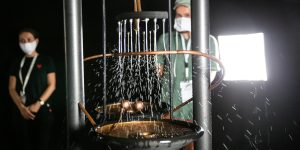
Dancing Water
Leon Kainz (AT)
This installation is based on a simple physical principle: the generation of electrostatic charges using water. The charged water droplets whirl in dynamic tracks around copper rods and react to nearby bodies. The collected charge can make a light bulb glow and generate flashes of lightning that can be centimetres long.
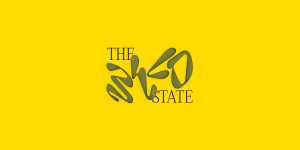
The Wild State
Campus
THE WILD STATE is the title of this year’s Kunstuniversität Campus activities at Hauptplatz Linz during Ars Electronica Festival 2020 from 9. – 13. September 2020. Existing since 2002, the intention of the Campus format is to invite outstanding international universities working in the academic fields of media arts and design. This year with an exhibition with contributions by various partner universities, as well as the departments Interface Cultures, Visual Communication, Fashion&Technology, Art Education, and Design: Tech.Tex. Special events comprise façade projection “Interfacing Hauptplatz”, the Internet flea market “Yami-ichi”, discursive format “Agora Digitalis” and the top notch nightline “Sound Campus”.

JKU LIT @ Ars Electronica
The digital revolution, demographic changes, and the climate crisis–addressing the complex, conflicting fields of our time requires an epistemic landscape that is conducive to traversing academic parameters. Crossing the borders between disciplines should be considered a starting point for possibilities – even essential as a to interlink them – rather than an act of deconstruction.
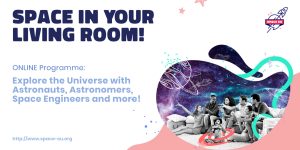
The Step into Space Garden
Leiden University (NL)
The Step into Space Garden is a journey of discovery through the story of space and your part in it. It presents online and in person events bring together space sciences and arts, through exhibitions and participatory activities with a focus on projects by and for youth.
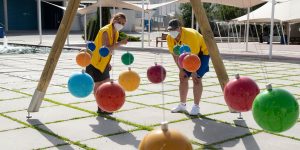
Pendulum Garden
Parque de las Ciencias (ES)
The Pendulum consists of 17 pendulums of different lengths and colors which represents the 17 Sustainable Development Goals. It aims to make society aware of the importance of achieving them by 2030. In this way, science and art come together to spread the importance of acting globally to achieve equality among people, protect the planet and ensure prosperity as part of the new sustainable development agenda.
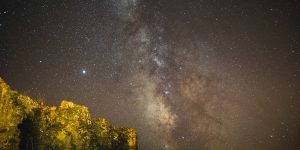
The Night Sky: Unveiling What Only the Dark Reveals
Open Science Hub - Portugal, Municipality of Figueira de Castelo Rodrigo (PT)
Open Science Hub - Portugal (OSHub-PT; Plataforma de Ciência Aberta) is a social innovation project that brings together science, technology and innovation with the daily life of local and regional communities, supporting schools and societal actors in tackling local relevant challenges. It is a project of the Municipality of Figueira de Castelo Rodrigo, in collaboration with Leiden University.
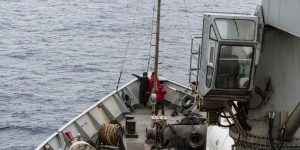
Achaeoscillator_Towards incorporeal forms of sensing listening and gaze
Terra Australis Ignota Research Group (CL) with Santiago Museum of Contemporary Art (MAC)
Achæoscillator displays the drastic weather conditions of the southernmost island in the world on a virtualized representation of the end/beginning of the Americas. A one-person experience, where the research presents traces and connections between the ancestors of the Yagán community, the Kawesqar and Selk’nam and the Antarctic, Scotia and South America continental plates, offering an inestimable and uncontrollable source of Gaia's power.
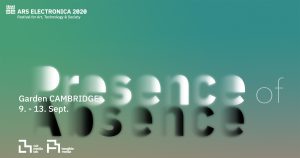
Presence of Absence
Tangible Media Group | MIT Media Lab (US)
The Cambridge Garden by Tangible Media Group for Ars Electronica Festival 2020, we will be featuring selected projects that materialize the Presence of Absence. Our garden introduces the latest in Tangible Telepresence research to engage people who collaborate across time and space with synchronized tangibles. We also feature a variety of dynamic computational materials we call Radical Atoms that foster a new form of human-material interactions.
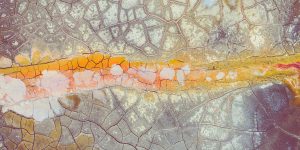
Speculating on the Future
Centre for Fine Arts (BOZAR) (BE)
BOZAR explores the role of scientific and technological research as an engine for creativity. The meeting of science, technology and the arts is the favoured basis for finding innovative responses to the social, ecological, and economic challenges that Europe will be facing in the near future. BOZAR joins the Ars Electronica Festival with its own interpretation of the Kepler’s garden, through the curation of 3 online events under umbrella name "Speculating on the future".
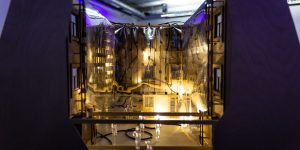
Art and Nanotechnology
gnration (PT) and INL – International Iberian Nanotechnology Institute (PT / EU)
gnration presents a virtual tour of The Invention of Sense by Marcel Weber. The exhibition explores extrasensory perception and a new sensuality. In the featured works, as well as in their presentation, Sensing, Discovering and Exciting are discussed, stimulated and elevated. The exhibition takes the premise further by extending the established restrictions of gallery space and turning the room itself into a medium and a stimulating, visceral experience.


